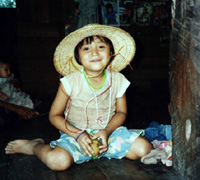
Photo. A girl with a warm and great smile that almost melted me.
Yes, as we experienced, Thailand can be considered and experienced in many ways. There is more visible historical evidence of past eras in this country than in any other South-East Asian country. Of course we were interested in ruins, temples and deserted cities, but the Golden Triangle was an area we would like to explore thourougly, but not without risk.
Tribes – how long will they keep the traditions?
Visiting hill tribe villages, elephant training camps, and taking a long-tail boat on the Mekong River that leads to the Golden Triangle, where the borders of Thailand, Burma and Laos convene, is an exciting experience wouldn’t miss for a million. For us it was now or never. We were absolute beware of that, as time goes by, the area will loose something of what made it unique for a long time ago.
Untouched areas are hard to find nowadays, and also in the Golden Triangle at this time (1987). Even the world’s most wide spread product Coca Cola had reached some parts of the area there.
We were greeted the best way all over where we came. The locals were really nice. As the Karen tribe, they always had a smiling face. Even though we were very excited about meeting these people, we tried our best to take our time to known them better before we took our first photos. By the way we showed them respect on, the local people were delighted to guide us around.
Photo. Visiting one of many tribes in the jungle.
Over 100 years ago, the Hill tribe people migrated south from China into what are now Burma, Laos, Vietnam, and Thailand. The six major tribes are the Karen (Kariang, Yang), the Hmong (Meo), the Yao (Mien), the Akha (Ekaw), the Lisu (Lisaw), and the Lahu (Mussur).
The main work in all these tribes is farming, and all of them tend to migrate whenever they feel that the soil at their present location is becoming depleted.
Photo. Rice field in beautiful surroundings.
Photo. Rice field with terraces.
Each tribe have its own distinguished culture, religion, language, art, and dress. With Thailand’s undergoing rapid modern development, it is difficult yet to say whether these tribes will continue in there traditional ways of life, or whether they will eventually be absorbed into the surrounding, and ever more-encroaching, Thai society.
One great experience was playing a kind of football with the tribesmen. I also played a kind of chess with them in the evening. Since we socialized by playing together, the focus switched over on doing something in common rather than how different we were from each other.
Photo. Playing Thai chess with one of the tribesmen.
So far everything had gone well on our tour. This was just the bright side of the hill tribe life. For there where more to see, and this made us worried for the local people (read the continuing story in part 3).
This story continues in Part 3: read and see more photos from the disreputable Golden Triangle!
Stein Morten Lund, 20th November 2001
Additional information
Etiquette: according to the web site Chiangmai-Chiangrai
(http://welcome-to.chiangmai-chiangrai.com/hiltribe.htm):
• It is kind, but not necessary; to give gifts to people you visit. Some suggestions or alternatives to sweets and cigarettes are balloons and other inexpensive toys, cosmetics, medical supplies antiseptic, mild painkillers such as aspirin, food, fruit, clothing, sewing supplies and foreign coins.
• Follow the advice of your guide; don't be afraid to ask questions. Respect the fact that you are a guest visiting the homes and villages of these people. By showing them that you foreigners are genuinely interested in them; your friendliness, sincerity and goodwill are the most precious gifts you can offer.
For general news, arrangements, tribes, cultures, customs etc. in the Golden Triangle and the rest of Thailand:
http://welcome-to.chiangmai-chiangrai.com/index.html
Read more about Thailand on our web site: Thai-boxers - the modern gladiators
Read more (click here …..)
